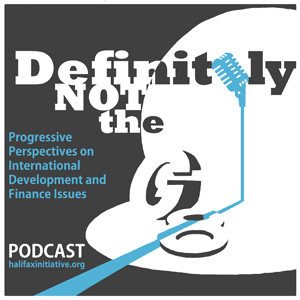Issue Update, June 2012
Climate finance: the World Bank, Export Development Canada and the Canadian government. Plus Rio+20 postmortem.
Climate finance: the World Bank, Export Development Canada and the Canadian government. Plus Rio+20 postmortem.
ODA accountability consultation; World Bank dumps human rights; Bank report on extractives ignores reality.
Submission by the Halifax Initiative and CCIC regarding implementation of the Official Development Assistance Accountability Act.
 |
Final script May 22, 2010; release date June 18, 2010. |
2010 G8/G20 Canadian Civil Society Coordinating Committee
Parliamentary Roundtables on the G8/G20 Agendas
Tuesday, April 27th, 2010 9:00 am - 11:00 am Room 2-2, National Press Building, 165 Sparks Street, Ottawa
Rethinking the international financial system during a time of crisis
Introduction
On October 19 and 20, 2009, the Halifax Initiative held a conference, co-hosted by The North South Institute, the University of Ottawa and the School of International Development and Global Studies (SIDGS), entitled "What’s Missing in the Response to the Global Financial Crisis?" The meeting brought together experts from a range of backgrounds to analyze the challenges facing the global economy, discuss the ways in which the international community has responded to the current financial crisis, and identify shortcomings in these responses.
G-20 response to financial crisis - money, money, money
All eyes were on the Group of 20 (G-20) this month as they met in London and announced a whopping $1.1 trillion to stimulate the global economy. The impressive figure and various commitments on tax havens, regulation, and boosting the IMF’s lending capacity (See “Just the Facts”) grabbed the headlines and saw stock markets respond positively the next day.
The World Bank and Climate Change
The World Bank is one of the most powerful financial institutions in the world. Created in 1944, the Bank has now become the world’s largest public “development” agency, influencing the policies of the majority of the world’s developing and emerging economies. In recent years, noting the significant impact that climate change is already having on developing countries and the gap in financing mechanisms available for addressing these impacts, the World Bank has increasingly staked a claim for itself as a key player on the issue – with widespread criticism from developing country governments and civil society around the world.
Bank pulls out of disastrous Chad-Cameroon pipeline
In early September, in a rare move, the World Bank pulled out of the $4.2 billion Chad-Cameroon pipeline due to ongoing tensions with Chad over oil profits the government had promised to spend on social programs. The exit was finalized when Chad prepaid the outstanding $65.7 m balance of its $140 m loan.